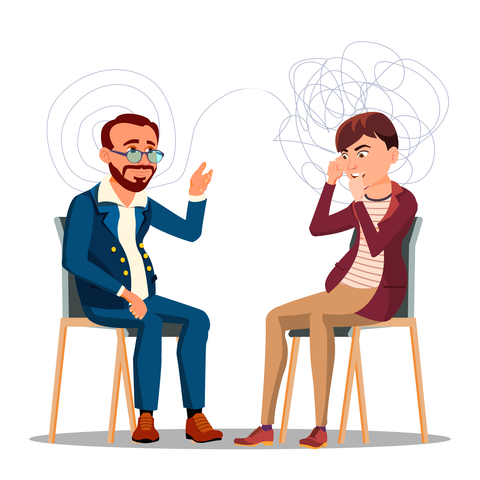How Mental Treatment for Adolescent People Can Foster Emotional Durability
Mental therapy for young adults offers as a vital source in addressing the one-of-a-kind psychological challenges they face. It creates a safe area for them to explore their ideas and sensations. With numerous therapeutic methods, teens can establish vital coping methods. This procedure not just help in handling anxiety however additionally boosts their interaction skills. As they navigate these developmental years, the question continues to be: exactly how can these abilities form their future interactions and health?
Understanding the Distinct Difficulties Encountering Teens
Teenage years is commonly celebrated as a time of growth and discovery, it is likewise marked by a myriad of special difficulties that can significantly impact mental wellness. Young adults navigate a detailed landscape identified by hormonal changes, peer pressure, and the quest for identification. The stress to stand out academically and socially usually brings about heightened stress and anxiety and anxiousness. The rapid evolution of innovation has presented concerns such as cyberbullying and social media comparisons, worsening feelings of inadequacy and isolation.
In addition, family characteristics can change substantially throughout this duration, with conflicts emerging as teenagers seek independence. Several additionally grapple with societal assumptions that can feel frustrating. These combined elements create a complicated emotional setting, making it vital to recognize and resolve the specific challenges teenagers encounter. Comprehending these struggles is vital for promoting supportive environments that promote psychological resilience and healthy and balanced development throughout this critical life phase.
The Function of Mental Therapy in Dealing With Emotional Struggles
Mental therapy plays an essential function in assisting young adults browse their emotional struggles, as it supplies a secure area for them to share their feelings and ideas. Several adolescents face difficulties such as anxiety, anxiety, and peer pressure, which can result in overwhelming feelings. With therapy, they can articulate these sensations and begin to comprehend their origins.
Specialists assist in open conversations, making it possible for young adults to explore their emotional landscape without judgment. This process promotes self-awareness, allowing them to recognize patterns in their actions and thoughts. Individual Counselling Toronto. Furthermore, mental treatment can aid teens create understanding right into their psychological responses, promoting much healthier coping systems
As they obtain a better understanding of their emotions, teenagers often find it simpler to manage tension and navigate interpersonal partnerships. Generally, mental therapy functions as an important intervention, empowering teenagers to address their emotional struggles and develop a structure for resilience.
Building Coping Methods Through Healing Practices
Healing techniques furnish teens with reliable coping methods to manage their psychological challenges. Through various methodologies, such as cognitive behavioral therapy and mindfulness techniques, teenagers learn to determine triggers and develop personalized actions. These practices encourage self-awareness, enabling individuals to acknowledge adverse thought patterns and replace them with constructive options. In addition, treatment frequently involves role-playing and situation evaluation, which provide functional frameworks for handling real-life circumstances.
Team therapy sessions can further improve finding out by promoting peer assistance and shared experiences, enhancing that encounter similar struggles. As young adults apply these techniques, they build durability, enabling them to browse stressors much more successfully. This proactive technique to emotional wellness not only help in instant coping but likewise lays the groundwork for lasting emotional stability. Inevitably, outfitting young adults with dealing strategies through restorative methods cultivates a sense of firm and empowerment in handling their mental well-being.
Enhancing Interaction Skills and Self-Expression
Effective communication and self-expression are important components of emotional well-being for young adults. Mental therapy provides a helpful atmosphere where adolescents can learn and exercise these skills. With restorative methods, teens are urged to express their sensations and ideas, cultivating a much deeper understanding of their emotions. This process promotes energetic listening, permitting them to involve more effectively with others, thereby improving interpersonal connections.

Long-Term Perks of Emotional Strength in Adolescence
While going across the difficulties of adolescence, the development of emotional resilience can yield significant lasting benefits for teenagers. Resistant individuals are much better geared up to take care of stress, which can bring about enhanced mental wellness outcomes in the adult years. They commonly experience lower prices of anxiousness and anxiety, cultivating a much more positive overview on life.
In addition, psychological durability enhances social relationships, as these individuals tend to communicate better and deal with conflicts with better convenience. This capability adds to more powerful social media networks and support systems, which are crucial during difficult times.
Durable young adults are more likely to accept difficulties as chances for growth, leading to raised academic and specialist success. Ultimately, the farming of psychological resilience during teenage years lays a structure for long-lasting coping approaches, empowering people to navigate future misfortunes with self-confidence and versatility.
Frequently Asked Questions
How Do I Know if My Teen Requirements Treatment?
Indicators a young adult might require treatment consist of consistent unhappiness, withdrawal from good friends or tasks, extreme changes in actions, decreasing scholastic efficiency, and trouble managing emotions. Observing these indications can trigger consideration for expert support.

What Sorts of Treatment Are A Lot Of Reliable for Teenagers?
Cognitive Behavior Modification (CBT), Dialectical Behavior Modification (DBT), click here for info and art or play treatment are amongst the most effective techniques for teenagers, aiding them develop dealing abilities, he has a good point boost emotional regulation, and reveal themselves in constructive ways.
How Can Moms And Dads Support Their Teenager During Treatment?
Moms and dads can sustain their teenager throughout treatment by proactively paying attention, confirming their sensations, preserving open interaction, encouraging involvement in sessions, and fostering a secure environment where the teenager really feels comfortable reviewing their thoughts and feelings.
Exist Any Dangers Connected With Adolescent Therapy?
Yes, threats linked with teen therapy include potential emotional discomfort, miscommunication in between therapist and teen, dependency on therapy, or direct exposure to unacceptable topics. In addition, not all specialists may have the essential experience with teen concerns.
Exactly How Lengthy Does Treatment Normally Last for Teens?
Therapy period for young adults typically varies from a few weeks to several months, relying on individual needs, goals, and the details problems being addressed. Individual Therapy Toronto. Sessions typically happen weekly, advertising progressive progression and emotional development
Mental therapy for young adults offers as an important source in attending to the special emotional challenges they deal with. Psychological treatment plays an essential duty in assisting teenagers browse their Recommended Site emotional battles, as it provides a safe space for them to express their feelings and thoughts. Indicators a teenager may need treatment consist of relentless sadness, withdrawal from good friends or tasks, drastic modifications in habits, decreasing academic performance, and problem handling feelings. Yes, threats linked with adolescent treatment include prospective psychological pain, miscommunication between therapist and teenager, reliance on treatment, or exposure to improper topics. Therapy duration for young adults usually ranges from a couple of weeks to a number of months, depending on individual requirements, goals, and the details issues being dealt with.